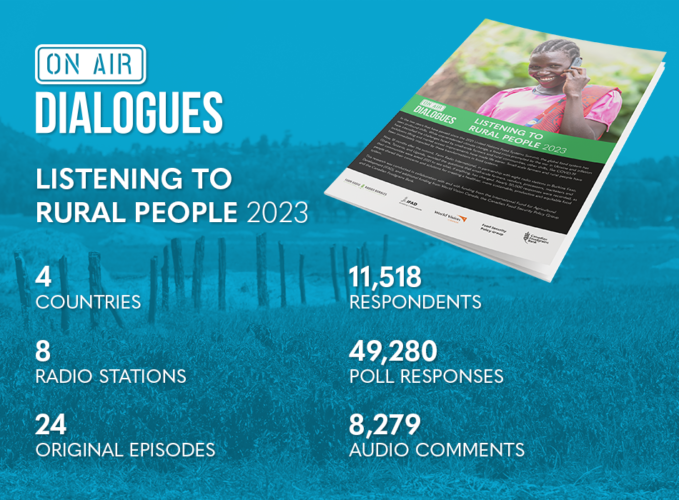Though climate change, food system shocks and inflation are intensifying the challenges faced by small-scale farmers in sub-Saharan Africa, they want to remain in their homes. According to a report released today, migration is the least viable option for African small-scale farmers. Of the thousands of farmers who participated in the four-country survey, around half also said that affordability, the availability of jobs and access to inputs had improved since 2021.
On Air Dialogues: Listening to Rural People 2023, released today by Farm Radio International (FRI), the International Fund for Agricultural Development (IFAD), World Vision Canada, the Canadian Food Security Policy Group (FSPG) and the Canadian Foodgrains Bank, includes data gathered over three weeks in June and July 2023 by eight radio stations in four African countries (Burkina Faso, Ghana, Tanzania and Uganda). Thanks to interactive radio programs and innovative mobile phone-based polling, farmers could directly voice their concerns and share their proposed solutions related to global food systems. In total, 11,518 participants left 49,280 answers and 8,279 audio comments.
Today’s release is timed to bring the voices of rural people to the Africa Food Systems Forum (AGRF) in Dar es Salaam, Tanzania — an event that includes global leaders, government officials, researchers, policy advisors, and heads of NGOs and companies — but very few small-scale food producers.
“The time of speculating about what women and men in rural areas want or of a small number of individuals speaking for the majority is coming to an end,” said Adeyinka Onikan, Farm Radio International’s Head of Specialty Services. “Farm Radio uses On Air Dialogues to provide a voice to the numerous rural people who are routinely left out of high-level talks affecting them. Their opinions matter and are pertinent to issues that have an impact on their lives. We must work creatively to remove the barriers that hinder them from expressing what they have to say.”
A farmer from Burkina Faso who participated in the survey pointed out the need for access to good-quality, affordable seeds. “We don’t have good seeds for crops and we don’t get good inputs easily. And even when they are available, they’re expensive,” they said. “If we can lower their price and help us to get them easily. Let’s lower the price of cereals.”
Respondents like this Burkinabe farmer called for access to high-quality agricultural inputs, information on adapting to climate change, secure access to and control over land, and better access to loans and credit to help them succeed at farming. Improved inputs was the top form of support requested by women over 30 for adapting to changing weather patterns.
“These findings clearly show the need for a massive scale up of investments to help small-scale farmers adapt to climate change and help build their resilience to shocks,” said Hélène Papper, Director of Global Communications and Advocacy at IFAD.
“Ensuring young people in rural areas can access financing and earn decent incomes is essential so that people are not forced to migrate—which they continue to see as a last resort,” added Ms. Papper. “The results we are getting today through these On Air Dialogues we designed with FRI are so incredibly exciting because they truly enable us to get unfiltered results and insights from the populations we work with much more directly. This rich quantitative and qualitative data can bring a whole new dimension in informing national and global policy decisions because it bridges the gap with populations in the most remote areas of the globe.”
Additional findings:
- Despite the impact of climate change felt across the continent, 94 per cent of callers felt there was something they could do in their own community to cope — like using improved inputs or protecting the natural environment. Migration is the least viable option for farmers in 2023, just as it was in 2021. Good information on adaptation ranks highly with farmers as a measure to cope with climate change.
- Compared to 2021, there has been a significant percentage increase in responses from families that are not worried about the safety and quality of food because they already eat safe and nutritious foods, especially in Burkina Faso (16 per cent) and Ghana (10 per cent). Some decline was seen in Tanzania (1 per cent) and Uganda (7 per cent).
- A larger percentage of families are finding other ways to earn money as a first step when there is food scarcity (29 per cent versus 20 per cent in 2021). The most popular measure remains asking everyone to cut back equally.
Visit https://dialogues.farmradio.org/oad2023 to read the full report, explore the results and listen to farmers’ voices.
____
Media contacts:
Adeyinka Onikan, Farm Radio International, [email protected]
Julie Marshall, International Fund for Agricultural Development, [email protected]
Linda Odhiambo, International Fund for Agricultural Development, [email protected]
Farm Radio International is a Canadian international non-governmental organization uniquely focused on improving the lives of rural Africans through the world’s most accessible communications tool, radio, in combination with Information and Communication Technologies (ICTs).
The International Fund for Agricultural Development (IFAD) is an international financial institution and a United Nations specialized agency based in Rome — the United Nations food and agriculture hub. IFAD invests in rural people, empowering them to reduce poverty, increase food security, improve nutrition and strengthen resilience.
World Vision Canada is a Christian relief, development and advocacy organization working to create lasting change in the lives of children, families and communities to overcome poverty and injustice.
The Canadian Food Security Policy Group is a network of Canadian development and humanitarian organizations with expertise in global food systems and food security in the Global South.
Canadian Foodgrains Bank is a partnership of 15 Canadian churches and church-based agencies working together to end global hunger. They work with locally-based organizations in developing countries to meet emergency food needs, achieve long-term solutions to
hunger and work to foster informed action by Canadians and governments to support this international cause.

